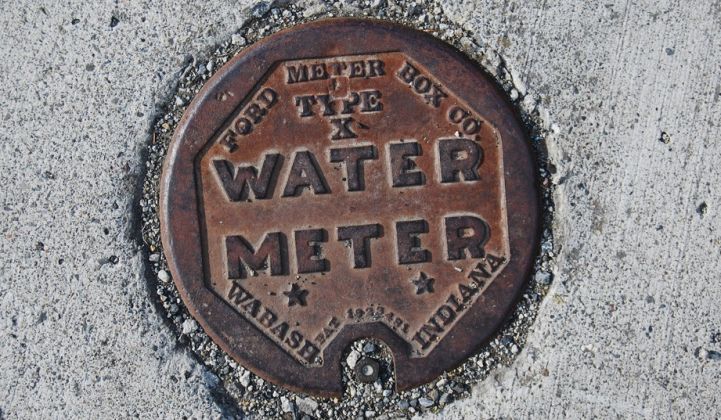Smart metering isn’t just about electricity -- natural gas and water are important market sectors too. Water, in particular, is primed for growth, as rising global demand and ever-shrinking supplies of fresh water make preventing the massive losses in the water sector worth spending money on.
Indeed, with much of the world’s water infrastructure nearly a century old, there’s a crying need to prevent “non-revenue” losses suffered by water utilities. The World Bank estimates that worldwide costs from unmetered water total $14 billion annually, and the EPA reports that the United States loses about 6 billion gallons of water from leaks every year.
That, in turn, is driving increased investment in technology to properly meter water, detect leaks, identify degrading systems and otherwise make water delivery more efficient. That investment can range from region-wide smart water projects, such as IBM’s investments in projects in Malta, Australia, Japan and the United States, to small-scale water meter deployments for municipal and regional water utilities across Europe and North America.
This week, big meter maker Itron announced a smart water meter project with Sydney Water, the water utility that serves 4.6 million customers in Australia’s biggest city. It’s one of the world’s largest smart water meter deployments to date, but if analysts’ projections are any guide, it won’t be the last.
Indeed, global smart water meter shipments are expected to reach 29.9 million units by 2017, up from just 10.3 million meters in 2011, according to Pike Research. That adds up to an annual market value of $476 million by 2017.
Key markets include Europe and North America. In Europe, research firm Frost & Sullivan predicts the smart water meter market will be worth up to £13.2 billion ($20.5 billion) by 2020, with “strong double-digit” growth over the decade.
As for the U.S. smart water market, the GTM Scott AMI Market Tracker predicts 2012 will see 5.5 million smart water meters networked, up slightly from 5.3 million in 2011.
Compared to the 15.68 million electric smart meters shipped in the U.S. last year, smart water meters are still a small market, roughly equivalent with gas metering, where 5.56 million meters were shipped last year, GTM research found.
But at the same time, the smart water metering market has seen far less penetration to date than either electric meters or gas meters, providing plenty of room for expanding markets. Leading vendors in the water metering space, in order of 2011 U.S. shipment volumes, are Neptune, Itron, Badger Meter, Sensus, Master Meter, Aclara, Elster and DataMatic, according to GTM market data.
Governments in Europe and North America haven’t mandated the deployment of smart water meters as they’ve done for smart electric and gas meters. Still, the rollout of communications systems to link these mandated smart meters can also be extended to include water.
London-area water utility Thames Water, for instance, is expanding its trial of connecting water meters with the same network that’s linking gas and electric meters. Sensus and Elster, two electric metering giants that also do gas and electric meters, have rolled out unified systems for some municipal utilities that handle all three resources.
In the meantime, there are plenty of ways to deploy technology in the water sector besides smart meters. Leak detection is one growing field, with giants like IBM and startups like Israel’s TaKaDu applying hardware, software and analytics to the task.
Other key water technologies include filtration and reverse osmosis technologies for water purification and desalination. Greentech Media has tracked hundreds of millions of venture capital dollars invested in water technologies over the past several years.



